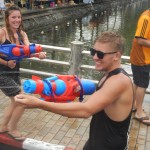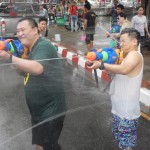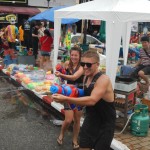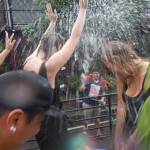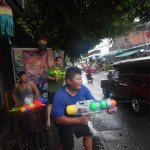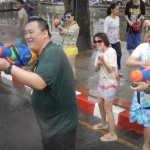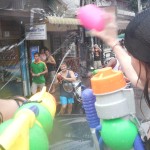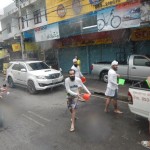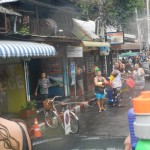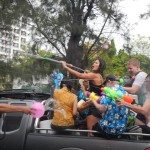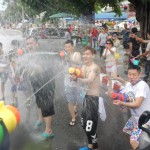As this year’s Songkran festivities and water-fights are already well under way, we would like to share some information about this holiday and tips for safe and fun celebrations.
Traditional Songkran celebrations
Songkran is a traditional Buddhist New Year celebrated in several countries in Southeast Asia. The word Songkran has its origins in Sanskrit where Saṃkrānti literally means “astrological passage” and this festive occasion stems from Buddhist/Hindu solar calendar and celebrates the sun moving from Aries to Taurus.
Before the festival officially begins Thai people clean their houses and take out all the clutter that could bring bad luck in the new year. They also wash Buddha images and statues for good luck. Traditional water pouring symbolizes cleansing and is meant to wash away the sins and everything bad. The water is filled with fragrant herbs when prepared in traditional manner. When the festival begins, Thai people visit Buddhist temples and pour water over Buddha statues, build sand castles and hang colourful flags on temple grounds.
Songkran in Chiang Mai
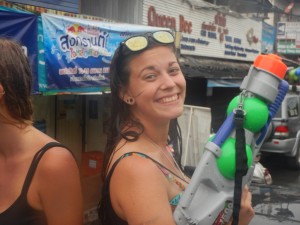
Songkran festival in Chiang Mai
In Thailand main Songkran festivities are held from 13th to 15th of April every year, but people in northern Thailand like to stretch out the fun and water-fights begin earlier and last longer than in the rest of Thailand.
You can expect to spend the festival soaking wet while engaged in full-blown water fights with water guns, hoses and buckets. If you wish to take a break from water splashing, there is a range of more traditional celebrations taking place in Chiang Mai as well.
Early in the morning on 13th April you can join merit making and alms giving at Thapae gate which is followed by an opening ceremony at 8 AM, around noon expect a number of Lanna girls holding open umbrellas to cycle by Thapae gate. This is a part of beauty contest which starts at the TAT office earlier in the morning. In the afternoon there is a parade of Buddha images and Miss Songkran float from Train station to Wat Phra Singh. First day finishes with Miss and Mr Songkran contest and Lanna arts competition at Thapae gate.
On 14th April there is a Buddhist procession with relics and holy sand. The procession starts at Iron bridge at 3 PM and ends at Thapae gate.
On the last day, 15th April, a procession starts from Three Kings Monument and ends at Governor’s Residence near Nawarat bridge where participants offer their blessings to the governor.
Tips for Songkran festival
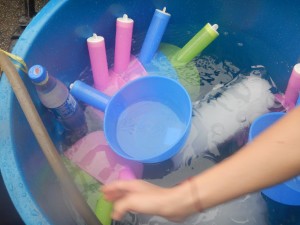
Water buckets and ice water
Don’t get angry when you get splashed with the water. If you don’t want to participate in water fights, you can politely refuse, and locals will mostly respect your wishes and just pour a bit of water on your shoulders as a sign of blessing.
Use clean and cool water, preferably from tap. You can use ice water, but be careful not to throw pieces of ice.
You can use guns, hoses, and buckets, but high pressure guns and hoses are prohibited and you can get fined for using them.
Wear goggles or protective glasses to keep water out of your eyes. Some of the water is not clean and can cause eye irritation. You can buy plastic glasses in 7/11.
If you can’t leave your electronic devices and other belongings at your accommodation, put them in a waterproof bag.
Use sunscreen, wear a hat, and bring drinking water with you.
Don’t wear jeans and other thick materials, as they will get heavy when wet. Avoid white clothes and clothes that become see through when wet. It’s best to wear a t-shirt, shorts and flip-flops. To dress like a local, buy colourful shirts and shorts with flower prints that are sold all over the city.
And most importantly, enjoy this crazy holiday and have a great Songkran!

